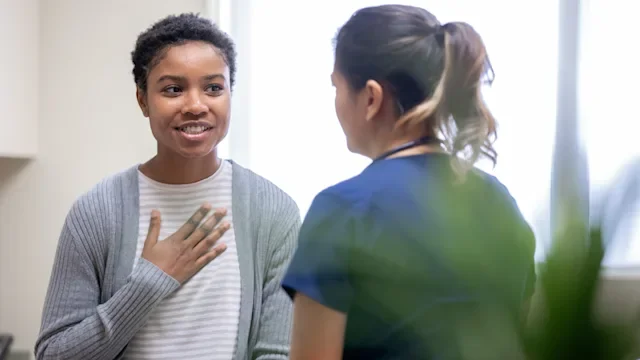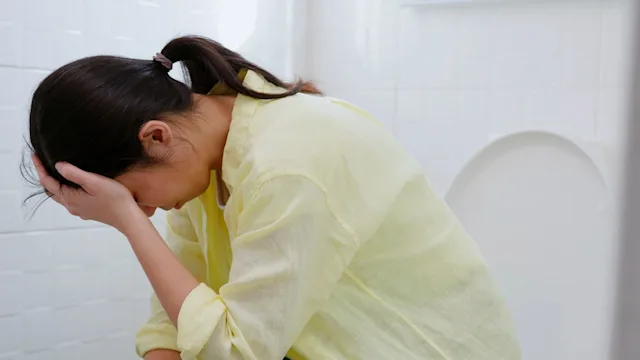Key takeaways:
The average urinary tract infection (UTI) lasts a few days to a week.
If you have a severe or complicated UTI, it can last much longer.
UTIs are typically treated with antibiotics. To have a quick and successful recovery, you have to finish the entire course of treatment.
If you’ve ever had a urinary tract infection (UTI), you’re likely familiar with the discomfort it can bring. UTI symptoms often include a burning sensation when you urinate and a frequent, urgent need to pee. It’s normal to wonder how long a UTI will last and what you can do to relieve symptoms.
Many people feel better within a week, especially if they take antibiotics. But the length of a UTI can depend on several things. Let’s take a closer look at the typical UTI recovery times and what you can do to feel better faster.
How long does a UTI last on average?
UTIs typically last from a few days to a week. Your overall health can affect how long a UTI lasts. People with weakened immune systems can have a harder time clearing a urinary tract infection.
Search and compare options
The number of days UTI symptoms last also depends on:
Where the infection is
How severe the infection is
When you start treating the UTI
UTIs can be classified as uncomplicated or complicated. Generally, a complicated UTI takes longer to treat. Let’s take a closer look at the differences between uncomplicated and complicated UTI.
Uncomplicated UTIs
Uncomplicated UTIs are the most common type. They tend to be easier to treat and faster to resolve. You’ll likely recognize the symptoms:
Pain or burning when urinating
Cloudy or smelly urine
Frequent and urgent need to urinate
Pain in your pelvic area
For uncomplicated UTIs, relief often begins 1 to 2 days after starting antibiotic treatment. But even if your symptoms improve, be sure to complete the full course of antibiotics. This’ll help to make sure the infection fully clears and reduces the chance of lingering or recurrent infections.
Prevent future urinary tract infections (UTIs): Get tips from our medical team to help lower your chances of developing a UTI.
How serious is your UTI? Understanding the differences between complicated and uncomplicated UTIs can help you know when to get help and which treatment may be the best for you.
Compare over-the-counter (OTC) options: OTC medications can’t cure a UTI. But they can help ease your symptoms.
Complicated UTIs
As the name suggests, complicated UTIs have a higher risk for complications. They’re more likely to develop in people with:
Structural issues in their urinary tract
Older age
Health conditions that weaken their immune system, like diabetes or pregnancy
Complicated UTIs can linger from weeks to even months. In severe cases, intravenous (IV) antibiotics are necessary to treat serious infections. So be sure to get medical attention if you have symptoms like:
Pain in your lower back or side
Nausea and vomiting
Achy joints or muscles
- AmoxicillinGeneric Amoxil
- AugmentinAmoxicillin/Potassium Clavulanate
- ActiclateDoxycycline Hyclate
Do you need to get antibiotics for a UTI?
Up to 2 in 5 uncomplicated UTIs can get better on their own without antibiotics. But healthcare professionals usually recommend antibiotics, as they’re the most effective treatment. Antibiotics work by stopping the bacteria that cause the UTI.
Most people don’t have risks of kidney damage or long-term problems from an untreated UTI. But for some, like those who are pregnant or have weakened immune systems, the risk for complications is much higher.
If you’re having UTI symptoms, talk with a healthcare professional about how to treat your UTI.
How long does a UTI last without antibiotics?
Without antibiotics, a simple UTI can last up to a week or longer. How long it lasts varies from person to person and depends on your body’s ability to fight the infection.
Leaving a UTI untreated or undertreated can lead to potential complications, like:
Kidney infection (pyelonephritis)
Kidney damage
Sepsis (a life-threatening immune response to infection)
How can you make a UTI go away faster?
In addition to taking antibiotics to clear the infection, there are a few steps you can take to help your UTI go away faster:
Stay hydrated. Drinking plenty of water can help flush bacteria out of your urinary tract, ease symptoms, and promote healing.
Avoid sexual activity. To prevent further irritation while you have a UTI, it’s best to avoid sex.
Use probiotics. Some studies suggest that probiotics may help prevent UTIs. They can help support a healthy balance of urinary bacteria.
Drink green tea. It contains compounds that may have antibacterial action against UTIs caused by Escherichia coli.
Frequently asked questions
Not exactly. Stress can cause behavioral changes that result in frequent urination or other symptoms of a UTI.
Other conditions can cause symptoms similar to a UTI. For example, burning with urination is also a symptom of a yeast infection or some sexually transmitted infections. These conditions typically have other symptoms that help distinguish them from a UTI.
Fevers, abdominal or flank pain, and nausea or vomiting are signs that your urinary tract infection may be spreading. Seek medical care if you develop these symptoms.
Not exactly. Stress can cause behavioral changes that result in frequent urination or other symptoms of a UTI.
Other conditions can cause symptoms similar to a UTI. For example, burning with urination is also a symptom of a yeast infection or some sexually transmitted infections. These conditions typically have other symptoms that help distinguish them from a UTI.
Fevers, abdominal or flank pain, and nausea or vomiting are signs that your urinary tract infection may be spreading. Seek medical care if you develop these symptoms.
The bottom line
The discomfort of a urinary tract infection (UTI) can be tough to handle, but most simple UTIs improve within a week. Knowing how to manage your symptoms and improve your recovery can help you feel better within a couple of days.
Treatment with antibiotics and proper hydration are key to a quick recovery. If you have UTI symptoms, let a healthcare professional know. They can help you figure out the best course of action to help treat your symptoms.

Why trust our experts?



References
Akgül, T., et al. (2018). The role of probiotics in women with recurrent urinary tract infections. Turkish Journal of Urology.
Bergamin, P. A., et al. (2017). Non-surgical management of recurrent urinary tract infections in women. Translational Andrology and Urology.
Bono, M. J., et al. (2025). Uncomplicated urinary tract infections. StatPearls.
Braga, A. A. N. M., et al. (2019). Association between stress and lower urinary tract symptoms in children and adolescents. International Brazilian Journal of Urology.
Colgan, R., et al. (2011). Diagnosis and treatment of acute uncomplicated cystitis. American Family Physician.
McCollum, B. J., et al. (2020). PURLs: Can drinking more water prevent urinary tract infections? Journal of Family Practice.
MedlinePlus. (2024). Urinary tract infection - adults.
Reygaert, W., et al. (2013). Green tea as an effective antimicrobial for urinary tract infections caused by Escherichia coli. Frontiers in Microbiology.
Sabih, A., et al. (2024). Complicated urinary tract infections. StatPearls.














